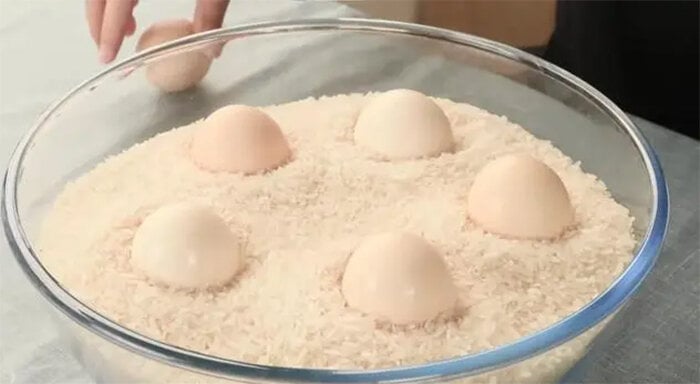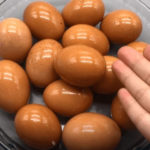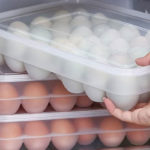Eggs are an essential ingredient in any kitchen. Whether boiled, fried, steamed, or used in any other recipe, eggs can always create delicious and appealing dishes.
2 ways to store eggs without a refrigerator, keeping them fresh for months
Not only are eggs a direct ingredient in many delicious dishes, but they are also an indispensable supporting ingredient in many dishes from both the East and the West. Therefore, the demand for this food item is enormous in every household. Almost every family keeps a stock of eggs at home for daily use. The refrigerator is the most popular place to store eggs, but it is not the most effective method.

Storing eggs in the refrigerator requires attention to their expiration date. (Photo: Sohu)
You don’t need to put the eggs in the fridge; try these two methods instead to keep them fresh for months
Storing eggs with cooking oil
To extend the shelf life of eggs, it is essential to keep them as far away from air and bacteria as possible. Storing eggs with cooking oil achieves this purpose. When you buy eggs, clean them with a damp cloth, then pour oil into a bowl and roll each egg in the oil.
The oil will create a protective layer around the eggs, preventing air and bacteria from penetrating. Place the oiled eggs in a clean plastic bag, squeeze out as much air as possible, and seal the bag tightly.
Finally, store the bag of eggs in a cool, dry place. This method can keep eggs fresh for several months without spoilage.

Instead of putting your newly bought eggs in the fridge, try dipping them in oil to create a protective layer. (Photo: Sohu)
Storing eggs with rice
Rice is a common food in daily life, and it has moisture-proof properties that create a relatively dry environment and inhibit bacterial growth. Therefore, we can also use rice to preserve eggs.
Prepare a large container, such as a glass jar or a plastic tray, and fill it with rice to about one-third full. Then, bury the eggs in the rice so that half of each egg is submerged, with the smaller end facing downward. This method effectively isolates the eggs from air and moisture and extends their shelf life.
Finally, seal the container tightly and store it in a cool, dry place. This method can keep eggs fresh for more than half a year without spoilage.

Rice creates a dry environment and inhibits bacterial growth. (Photo: Sohu)
Notes on egg storage
To extend the shelf life of eggs, pay attention to how you clean them when you first buy them. Many people wash eggs with water, which seeps into the eggs and shortens their shelf life. This is because the surface of an egg has a natural protective layer, called the cuticle, that prevents the penetration of air and bacteria while maintaining moisture and nutrients inside.
Washing eggs with water can destroy this protective layer, making them more susceptible to spoilage. Instead, the correct method is to wipe the eggshells clean with a damp cloth. If there are stubborn stains, avoid using too much force, as this may damage the cuticle. After wiping, arrange the eggs in an egg tray or another container with the small end down and the large end up. The reason for this is that the larger end has an air pocket that can adapt to changes in temperature and pressure, helping the eggs retain their color and flavor.
If you choose to store eggs in the refrigerator, keep them away from other foods to prevent them from absorbing odors or bacteria. Eggs stored in the refrigerator should also be consumed as soon as possible and regularly checked for spoilage.
According to VTC



































